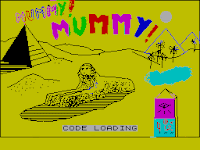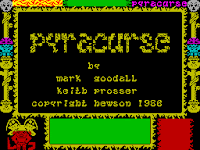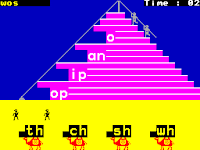The author of this blog occasionally casts a glad eye at ancient civilisations outside Greece and Rome. After all, we're all part of the same world, and many of the issues regarding ancient worlds in videogames are much the same regardless of cultural context.
Here are two arguments for why Egypt has fared so well as the subject of videogames, beyond the basic fact that almost everyone (especially under the age of 12) thinks mummies and crocodiles are cool. Egypt was very popular in the first computer games to enter the home - simple programs on machines like the Acorn, the BBC Micro, and successive versions of the ZX Spectrum. There are perhaps dozens of titles from the eighties, most of them simple maze or platform action games, others more puzzly.
Argument 1: a pyramid is triangular. A triangle is a simple shape (stop me if I'm going too fast). Simple shapes are easy to program, and easy to recognise. Therefore Egypt can very quickly be evoked through some yellow triangles, some palm trees and mummies, maybe some pretend hieroglyphics, and some beeps resembling the traditional 'Egyptian' tune now generally used for comic effect (I have no idea what it's called - Egyptian Reggae by Jonathan Richman sounds a bit like it).

Pyramid of Rameses (1987)

Mummy! Mummy! (1984)

Pyracurse (1986)
Pyramids (1987)
There's probably a family tree to be discovered here, but I'm too lazy (which is also why all of these examples are from ZXS games).
Argument 2 is of course the very fact that Egypt can be conjured up so easily by so very few signs. This is the advantage of taking on a culture without much of its own literature - everything has been hearsay, and becomes a cliche all too easily. I'm not sure which came first, Egypt's iconic simplicity or its massive dependence on the tourism trade - I think they create one another.
A later stage in this story is that there are literally hundreds of Egypt-themed games out there now - they've been streaming out for the last two decades - and far and away the majority are disposable puzzle-based tat (falling blocks, coloured gems, bubbles to match up, etc). It seems to be a law of nature that anyone who can write Flash games must at some point write a Pharaoh's Treasure or Pyramid Curse.
I think once upon a time some videogames player's ancestor must have desecrated a pyramid.
Saturday, 15 March 2008
The 'pyramid base' of antiquity on home computers
Labels:
1980s,
Acorn,
BBC Micro,
educational games,
Egypt,
home computers,
iconography,
music,
pyramids,
ZX Spectrum
Subscribe to:
Post Comments (Atom)

No comments:
Post a Comment